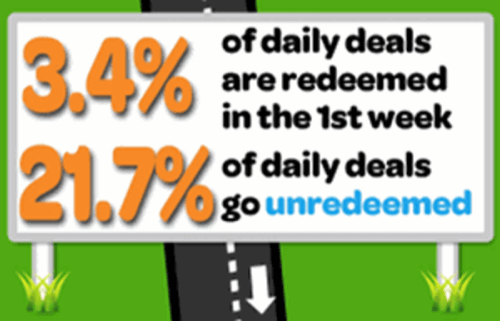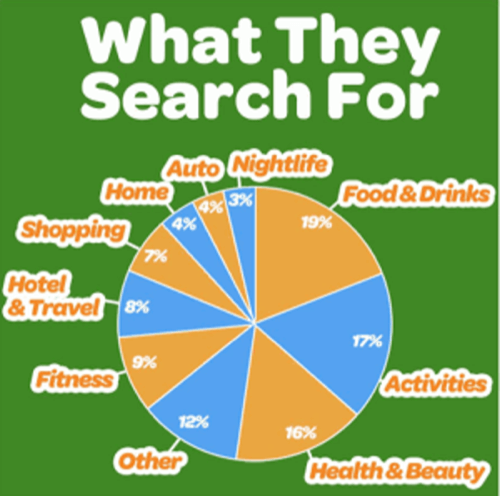DealsGoRound says it has uncovered a $577 million opportunity in the daily deals space. Nearly 22% of deals purchased from Groupon, LivingSocial, BuyWithMe and elsewhere go unredeemed according to a survey from Rice University. This represents a huge secondary market for re-selling deals, which is precisely what DealsGoRound does. To illustrate the opportunity here, DealsGoRound has released the following infographic breaking down what Petersen calls the “cycle” of daily deals.

Filling a Void
DealsGoRound CEO Kris Petersen says that deals are going unused across all categories, from food and drink to fitness to travel. “We’re really filling a void where [the daily deal vendors] are leaving off,” Petersen says, “and not because they don’t care,” but because it’s a necessarily low priority for them.

Meanwhile, these companies are selling so many deals that the average customer is stuck with six at a time, and one or more of those goes unspent. Its value vanishes. So consumed with selling new deals and attracting new customers, coupon sites are apparently leaving hundreds of millions of dollars, and lots of new customers for their clients, on the table.
Estimating the Size of the Market
As far as the size of the table, whether DealsGoRound’s $577 million is a reasonable number, it’s worth doing another back-of-the-envelope calculation. Respondents to the Rice survey reported that 21.7% of deals went unfulfilled. The study only covered 23 U.S. markets, and it had a 27% response rate, meaning that the non-respondents could be significantly different from the respondents, which would leave skewed results. One possible bias would be that dissatisfied customers could be more likely to voluntarily respond to a survey.
Nevertheless, the Rice study points to surveys in different markets that had similar response rates and showed comparable results. Since DealsGoRound finds that people sit on six unredeemed deals at a time, let’s assume it’s reasonable that 21.7% of those – about one – goes unredeemed each time. Granting that, we could apply it to estimates of the size of the daily deals market. Wall Street analysts estimated the size of the global daily deals market in 2011 to be almost $3.7 billion, and 21.7% of that would be over $800 million. Assuming that’s a rather bullish estimate – and allowing for some response bias in the Rice survey, $500 million or so in unredeemed deals sounds plausible.

The Secondary Market
DealsGoRound is among a handful of sites picking up the pieces of this secondary market, including Lifesta, CoupRecoup and Sell My Deal. There’s an Australian site called redealize with international ambitions. And there’s a site called dealigee, which is owned by a Chicago-based company. Chicago is Groupon country, and DealsGoRound hails from there as well. But Petersen has grown his startup from a Craisglist-style free-for-all into a PayPal-powered, feature-rich marketplace serving 128 cities in the U.S. and Canada. The pot in 2011 is up to is $577 million or so, so the race is on for the secondary daily deals market.
Good for Business?
We’ve written before about the open question of whether daily deals are good for small businesses, and Petersen regularly encounters the criticism that some businesses depend on deals going unredeemed to keep from breaking the bank. “Businesses would prefer for those 21.7% of people to show up,” Petersen says, because that’s their opportunity to up-sell customers and build loyalty.
“If people are [offering daily deals] in hopes that the breakage [revenue] is how they make their money,” Petersen says, “then I think they’re sorely mistaken about the value they’re getting out of this whole industry.”
Disgruntled Business Owners
The study from Rice found that 55.5% of businesses surveyed made money on their daily deals promotions, 17.9% broke even, and 26.6% of businesses lost money. Keep in mind that 21.7% of their deals go unredeemed, which means the businesses pocket the money.

Almost 80% of customers who redeemed deals were new customers, but only 36% of them spent beyond the face value of the deal, and the study says that only 20% of customers returned to purchase something at full price.
It would take a much bigger study to be precise, but the margins on these deals are thin, and significantly increasing the amount of deals that get cashed in would reduce their value for businesses even more. The Rice study found that just under half (48%) of surveyed businesses would definitely run a second daily deal promotion.
The study also found no significant performance differences between the various daily deal sites. No Groupons or LivingSocials stuck out from the pack as far as how well their marketing paid off for their client businesses.
Wasted Deals Are Wasted Deals
But with hundreds of millions in deals just vanishing, Petersen thinks the consumer is getting hurt, and that hurts businesses, too, ultimately. Getting stuck with a deal could lead consumers never to buy one again. By enabling consumers to resell unused deals, Petersen believes DealsGoRound helps keep the daily deals business cycle in motion.
To illustrate the secondary market opportunity, DealsGoRound has produced this infographic (see below) with their own data as well as data from Mob Manager, the Rice University study and Local Offer Network.

Have you ever purchased a deal that went unused? Let us know in the comments.

















